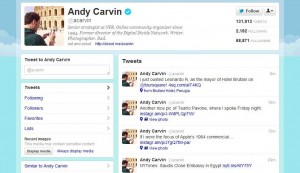Twitter Writes History? Absolutely!
On Friday Apr. 27 Andy Carvin gave his key note speech on the use of Twitter for real life reporting on the example of covering the Arab Spring. On Saturday’s hot Italian morning we caught Andy for a short talk.
The interesting moment of Carvin’s story is that he covered the events which took place in Middle East and African countries being on the other side of the world by reading, researching and reporting on the Arab revolutions via Twitter.
“I sometimes prefer what I do to call open-source, networked or collaborative journalism, but the reason why we have these terms now is because they are still so unusual for us, and we feel like we need the new ways of describing it. I have a feeling that in a couple of years we’ll discover this journalism. As we become more comfortable with this new form, it becomes less needed to have its own name,” said Carvin.
Twitter proposes interesting and comfortable ground for citizen journalists, who probably did the most of reporting on Arab Spring. Still what citizen journalism is and how citizen journalists influence the situation in media remains unclear.
“I’m not fan of the term citizen journalism, but I use it a lot just because we don’t have a language within journalism to describe some these new roles. For me it’s when journalism is conducted by people who are not professional journalist and are not affiliated with news organisation. They are definitely those people who happened to be at the right place at the right time, like man in Pakistan who livebloged the raid that killed Usama bin Laden. He didn’t know he was doing a form of journalism at that time but it turned out that he was, and he was only one reporting it.”
The most interesting question is whether we should trust what citizen journalist write or say, especially on such serious topics as Arab Spring.
“It depends,” said Carvin. “Why not? Occasionally we meet people that pretend to be citizen journalists. But I know some protesters in Egypt who were really good citizen journalists, they did photography, they shot video, they conducted interviews. That doesn’t mean that you can forget that they have a particular agenda, but you have to judge them on the terms of their work. Some of these protesters in Egypt were the best photojournalists of the revolution as they were in the middle of it. It depends on the person but I think we can’t assume just because someone is a citizen journalist that he is a liar. I think we need to start the conversation based on making a sincerer attempt at creating journalism. By having a conversation between professional journalists and citizen journalists it raises the quality of work on both sides.”
As Twitter became a real live blog that caught a history of the events which shortly will become a part of a common core at schools, we can consider it as a tool, which helps us to write our history.
“In the US Library of Congress there are the copies of all tweets. You can’t access them now but they’re collecting all tweets. I remember someone asked me why they wanted to record all these people saying what they had for breakfast. And my response was in 100 years from now someone of these people will become a president of the US. Can you imagine if we have daily diaries of people before they become famous or people who suddenly find them in a centre of a revolution or a big news story. Just because a person is ashamed of kind of a boring stuff on Twitter it doesn’t mean it won’t be useful at some time. I think Twitter is a real time history collector, world history collector”.
The length of tweets is one of the key topics that people are complaining about.
“I’m sure that is what makes it work,” said Carvin. “It is a lot more difficult to keep up this conversation to people writing 5.000 words. If people really have 5.000 words to share they can put it on the blog and share the link. Twitter forces you to be concise. And sometimes it’s not different from the way traditional journalists should work. You can’t go on forever, you have to be concise and say what’s on the point and share information in such a way that readers can understand it quickly.”
Another key topic is what we learn from social media like Twitter and what we lose by using it.
“Twitter makes it harder to write. I used to write 3.000-5.000 words a day. For a long time I was on twitter and I started to forget how to do that. But we can’t accuse Twitter. It’s economic scheme of digital journalism that makes the blast coming.”
By Ekaterina Kravtsova

